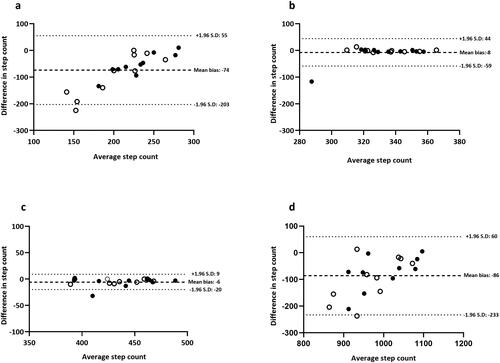Caroline Reilly , MSC,Antonis Stavropoulos-Kalinoglou , PhD,Ian Clifton , FRCP, MD,Jim McKenna , PhD,Daniel Peckham , FRCP, MD & Oliver J. Price ,
Abstract
Objective:
The aim of this pilot validation study was to determine the accuracy of a smartphone (iPhone®) pedometer in adults with and without asthma.
Methods:
Ten adults with asthma and ten healthy controls underwent clinical assessment prior to completing two separate trials. Phase 1. standardized treadmill and self-paced walking tests. Total steps were recorded via: (i) Yamax Digiwalker™ SW800 pedometer positioned on the waistband, (ii) iPhone® pedometer positioned on the upper body, (iii) iPhone® pedometer positioned on the lower body and evaluated against a video-verified manual step-count. Phase 2. step-count was evaluated over seven-days during habitual free-living conditions via Yamax Digiwalker™ SW800 and iPhone® pedometers.
Results:

During treadmill walking, the iPhone® positioned on the lower body correlated strongly (r = 0.96) and produced the highest level of agreement (mean bias: −11 steps, LOA: −43 to 21 steps) in comparison to video-verified manual step-count. During self-paced walking, all devices provided an excellent step-count estimate. During free-living conditions, no difference was observed between the Yamax Digiwalker™ SW800 pedometer and iPhone® (P = 0.10) and a strong correlation (r = 0.94) and acceptable agreement (mean bias: −343, LOA: −1963 to 1276 steps) was observed.
Conclusion:
Our findings indicate that an in-built iPhone® pedometer offers a practical approach to physical activity assessment in adults with and without asthma. Future research is now required to further validate the precision of this approach and evaluate the efficacy and effectiveness of smartphone pedometers to monitor and promote physical activity when employed during medical consultation and/or clinical research trials.
